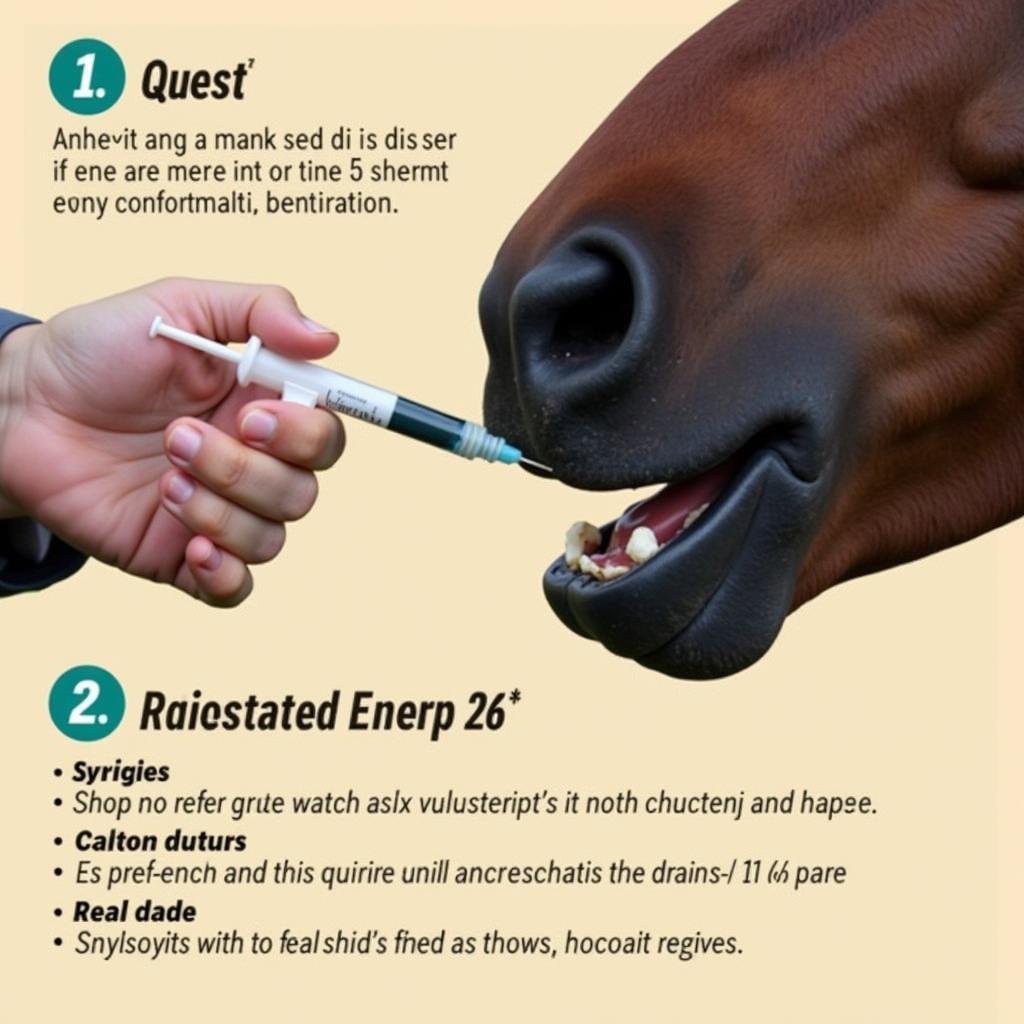Quest Dewormer Horse is a common topic among horse owners, and choosing the right worming program is crucial for your horse’s health. Internal parasites can significantly impact a horse’s well-being, causing a range of problems from poor coat condition to serious colic. This guide will cover everything you need to know about Quest dewormers, including how they work, proper administration, and developing a tailored deworming schedule for your equine companion. Let’s dive in and explore the world of equine parasite control.
Understanding the Importance of Deworming Your Horse
Deworming, also known as worming, is a vital aspect of horse care. Parasites, if left unchecked, can wreak havoc on a horse’s digestive system, leading to weight loss, diarrhea, and even colic. They compete with your horse for essential nutrients, impacting growth and overall health. A regular deworming program, often utilizing products like Quest dewormer, helps to minimize these risks and maintain your horse’s vitality. Choosing the right dewormer and administering it correctly is essential for optimal results. For example, you might be interested in learning more about quest plus gel horse dewormer.
Quest Dewormer: An Effective Solution
Quest dewormers are known for their effectiveness against a broad spectrum of internal parasites in horses. The active ingredient, moxidectin, works by disrupting the nerve and muscle function of the parasites, leading to their paralysis and eventual expulsion from the horse’s body. Quest comes in various formulations, including paste and gel, offering flexibility in administration. Consult with your veterinarian to determine the best Quest product and dosage for your horse’s specific needs.
 Applying Quest Dewormer to a Horse
Applying Quest Dewormer to a Horse
Developing a Targeted Deworming Strategy
While Quest dewormer is a powerful tool, a one-size-fits-all approach to deworming is no longer recommended. Modern best practices emphasize targeted deworming, which involves fecal egg counts and identifying specific parasites present in your horse’s system. You can find more information about worming frequency at how often should you worm your horse. This strategy ensures that you are treating the actual parasites affecting your horse, minimizing the risk of resistance development.
Administering Quest Dewormer Correctly
Proper administration of Quest dewormer is essential for its efficacy. Follow the instructions on the product label carefully. The paste is typically administered orally using a calibrated syringe, ensuring the full dose reaches the horse’s stomach. Be sure to restrain your horse gently but firmly during administration to prevent injury to both you and the animal. Always consult your veterinarian if you have any questions or concerns about the administration process.
 Analyzing a Horse Fecal Sample for Parasite Eggs
Analyzing a Horse Fecal Sample for Parasite Eggs
Why Choose Quest Dewormer?
Quest dewormer is a popular choice among horse owners for several reasons:
- Broad-spectrum activity: Effective against a wide range of common equine parasites.
- Convenience: Available in easy-to-administer paste and gel formulations.
- Targeted approach: Allows for tailored deworming programs based on individual needs.
- Proven efficacy: Backed by research and widely used by veterinarians.
“Regular fecal egg counts are crucial for effective parasite control. They allow us to tailor deworming programs to each individual horse, minimizing the risk of resistance,” says Dr. Emily Carter, DVM, specializing in equine internal medicine.
How Often Should I Deworm My Horse with Quest?
The frequency of deworming with Quest depends on various factors, including your horse’s age, living conditions, and overall health. Your veterinarian can recommend a suitable schedule based on your horse’s specific needs. Traditionally, horses were dewormed every 6-8 weeks, but targeted deworming programs are now favored to reduce the risk of parasite resistance. Another popular dewormer option is strongid paste for horses.
 A Healthy, Dewormed Horse Grazing Peacefully
A Healthy, Dewormed Horse Grazing Peacefully
Conclusion
Quest dewormer horse is a valuable tool in maintaining your horse’s health. By understanding the importance of deworming, choosing the right product, and following a targeted approach, you can effectively protect your equine companion from the harmful effects of internal parasites. Remember to consult with your veterinarian to develop a customized deworming program and address any specific concerns. Regular veterinary check-ups and fecal egg counts are key to ensuring your horse remains parasite-free and thrives.
FAQ
- What are the signs of worms in horses? Weight loss, poor coat condition, diarrhea, and colic are common signs.
- Can I deworm my pregnant mare with Quest? Consult your veterinarian for guidance on deworming pregnant mares.
- How do I store Quest dewormer? Store according to the instructions on the product label, typically in a cool, dry place.
- What should I do if my horse experiences side effects after deworming? Contact your veterinarian immediately.
- Are there any natural alternatives to chemical dewormers? While some natural remedies exist, consult your veterinarian before using them.
- How can I prevent my horse from getting worms? Good pasture management and regular fecal egg counts are key.
- What other deworming products are available besides Quest? There are several other effective dewormers available. For instance, you could consider quest plus wormer for horses.
Common Scenarios and Questions
- Scenario: Your horse is losing weight and has a dull coat. Question: Could this be a sign of worms?
- Scenario: You’ve just purchased a new horse. Question: When should I deworm it?
- Scenario: Your horse is showing signs of colic. Question: Could parasites be a contributing factor?
For further information on horse health, you can also read our article on do horses have fleas.
If you need any assistance, please contact us. Phone: 0772127271, Email: [email protected], Address: QGM2+WX2, Vị Trung, Vị Thuỷ, Hậu Giang, Việt Nam. Our customer service team is available 24/7.